|
Books Should Be Free Loyal Books Free Public Domain Audiobooks & eBook Downloads |
|
|
Books Should Be Free Loyal Books Free Public Domain Audiobooks & eBook Downloads |
|
Literature |
|---|
|
Book type:
Sort by:
View by:
|
By: Anthony Trollope (1815-1882) | |
|---|---|
 Kept in the Dark
Kept in the Dark
Kept in the Dark is a novel by the 19th century English novelist Anthony Trollope. It was published in eight monthly installments in 1882, and also in book form in the same year. Cecilia Holt ends her engagement to Sir Francis Geraldine because of his indifference to her; she goes abroad and meets Mr George Western, who has been jilted by a beautiful girl. They marry but she does not tell him she has been previously engaged, although he has told her his story. When Western is informed of the previous engagement by Sir Francis, Western leaves his wife and goes abroad; she returns to Exeter to live with her mother... | |
 Aaron Trow
Aaron Trow
What is it like to be a fox hunted by hounds? We find out through the senses of an escaped convict as he struggles to free himself from would-be captors. The struggle is brutal. In the end, we are left wondering which person really wins--the pursued or the pursuer. Or perhaps which one is now the pursuer, which the pursued. | |
 An Old Man's Love
An Old Man's Love
This was Trollope's last completed novel, and he may have acquired his sympathy for older lovers with age! A not-so-very-old man, Mr. Whittlestaff, dearly loves Mary Lawrie, the girl he provides a home for after her father's death. He wishes to marry her, and she reluctantly accepts him, but warns him of her deep regard for a young man she had known years earlier. That Mr. Gordon had not exactly engaged her, but had gone off to seek his fortune and had not communicated with Mary ever since. Shortly after Mary accepts Mr. Whittlestaff, Gordon shows up. Trollope works out a final arrangement which resolves the quandary, but not with comfort. (Arnold Banner) | |
 Macdermots of Ballycloran
Macdermots of Ballycloran
This is the story of the Macdermots of Ballycloran the story is about the tragic demise of a landowning family. Larry Macdermot lives in a dilapidated mansion in Co. Leitrim, whose mortgage to Joe Flannelly he cannot keep up. Enmity between the Macdermot and Flannelly families is sharpened by son Thady's having declined to marry Joe Flannelly's daughter, Sally. Macdermot's daughter, Feemy, is herself seduced by the locally hated English police officer, Captain Myles Ussher. This was Trollope's first published novel, which he began in September 1843 and completed by June 1845. However, it was not published until 1847. | |
 Struggles of Brown, Jones, and Robinson
Struggles of Brown, Jones, and Robinson
Billed as a satire concerning the dishonest advertising and business practices of the day, it tells the tale of an upstart clothing business doomed from the get-go to utter failure. Its senior partner (the elderly Brown, who provides the investment) is far too timid for business. His son-in-law (Jones, who runs the store) is stealing from the till, and the junior partner, Robinson (who writes advertisements for the store) is so obsessed with the idea that advertising alone will drive the business, he uses up every last penny of the capital investment in a series of increasingly ludicrous ad campaigns and publicity stunts... | |
 Ralph the Heir
Ralph the Heir
As usual, Trollope creates a nice variety of characters of different English classes, sentiments and positions. The primary themes are the inheritance of property, extravagance or reason in the spending of assets, the mating of young people, and the electoral practices of the time. The election chapters are based on Trollope's own experiences when he ran for Parliament.There are, of course, many subplots which allow Trollope to express, through dialog, his opinions about greed, snobbery, work ethics and dandyism... | |
 Nina Balatka
Nina Balatka
A romance set in Prague between a Catholic and a Jew. In this short novel, Trollope moves away from his usual milieu to explore a theme which has universal resonance. | |
By: Anton Chekhov (1860-1904) | |
|---|---|
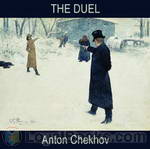 The Duel
The Duel
The plot centres around Laevsky, who is living in a small seaside town in the Caucasus after running away with another man's wife, Nadyezhda Fyodorovna, amid dreams of starting a new life.The dreams have come to nothing as Laevsky idles away his life drinking and playing cards, and Nadyezhda begins to have other affairs.Laevsky's scheme to run away again, this time without his mistress, brings him into conflict with the rationalist Von Koren, who believes in Darwinian principles of natural selection and extinction of the weak and useless.Matters come to a head when an outburst from Laevsky leads to a duel. Von Koren is determined to teach Laevksy a lesson.(Introduction by Phil) | |
 Ward No. 6
Ward No. 6
The line between sanity and insanity is blurred in this classic novella by Anton Chekhov. The disillusioned idealist Dr. Rabin is in charge of a provincial lunatic asylum, overseeing with weary, dubious policies a motley group of patients, a group that mirrors in microcosm all of human and especially Russian society. Seeking answers to profound questions, Dr. Rabin enters into dialogues with both staff members and patients, trying to make sense out of what has become of his life, until it becomes less and less clear who is the doctor and who is the patient... | |
 Anonymous Story
Anonymous Story
In "An Anonymous Story," Chekhov continues to explore his favorite themes of superfluous men, ironic rakes, exploited women, and the dangers of social conventions to human happiness. The Anonymous Narrator is a feckless, would-be revolutionary who gets himself hired on as a flunkey in the household of the young useless aristocrat Orlov, hoping to spy out some useful information for the Cause. Orlov seduces the beautiful Zinaida Fyodorovna away from her husband but quickly tires of her. The Narrator, another in the long line of Russian literary superfluous men, allows Orlov to use him to deceive Zinaida Fyodorovna, hating himself for it all the while... | |
 My Life: The Story of a Provincial
My Life: The Story of a Provincial
A provincial youth of wealth and noble status refuses to employ himself in the typical occupations of the higher classes, thus acquiring a reputation as a lazy good-for-nothing. In reality, he is intensely sensitive to the injustices perpetrated by his social class upon the working classes of town and country, and resolves to become a common laborer, taking employment as a house painter and ikon gilder. All classes of society around him respond to this revolutionary action with bewilderment and ridicule, even the lowest workmen feeling threatened by this insolent shaking of the cosmic structure... | |
 Steppe
Steppe
Little Yegorushka goes off to school for the first time, setting out on the journey in the company of his Uncle Ivan, the local priest Father Christopher, and the fun-loving servant Deniska. Along the way they meet an extraordinarily colorful array of characters, named and nameless: the innkeeper Moisey Moisevitch, the beautiful Countess Dranitsky, the mysterious Varlamov, Emelyan the voiceless singer, Tit the steppe waif, and many more. But the most colorful and extraordinary character of all is the Steppe itself in every mood and weather, painted stroke-by-masterly-stroke by Chekhov in all its wild, musical, redolent, flowering, chirruping, infuriating exuberance. (Expatriate) | |
 Three Years
Three Years
Laptev, the rich but unattractive scion of a merchant, renounces his independent-minded, intelligent, devoted, but equally unattractive mistress Polina in order to marry the beautiful young gold-digger Yulia. Their life together quickly deteriorates into a loveless agony, Laptev seeking some sort of meaning in his life while Yulia whiles away her youth with the sparkling young Moscow social scene. The compelling question of the story is whether or not Laptev and Yulia can redeem something of lasting value from what seems to be a hopelessly empty relationship... | |
 Black Monk
Black Monk
Aspiring academic Andrei Kovrin, while summering in the countryside per the advice of a physician, is haunted by the apparition of a black monk that appears only to him and encourages him in his intellectual pursuits. Although Kovrin is the only one who can see the apparition, the monk assures him that, even if he were a creation of the imagination, he would still be a thing of nature and consequently real. Chekhov uses this vehicle for a gothic exploration into scholarly obsession and madness. - Summary by Daniel Davison | |
By: Aphra Behn (1640-1689) | |
|---|---|
 Rover (Part One)
Rover (Part One)
| |
By: Aristotle (384-322 BC) | |
|---|---|
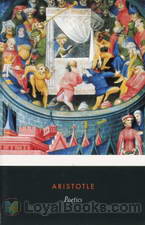 Poetics
Poetics
Aristotle’s Poetics from the 4th century B.C. aims to give a short study of storytelling. It discusses things like unity of plot, reversal of situation, and character in the context of Greek tragedy, comedy and epic poetry. But it still applies today. It is especially popular with screenwriters as seen in many script gurus’ how-to books. | |
By: Arnold Bennett (1867-1931) | |
|---|---|
 The Card
The Card
The ‘Card’ in question is Edward Henry Machin – his mother called him ‘Denry.’This light-hearted story is of his rise from humble beginnings as the son of a washerwoman and sempstress in the last quarter of the nineteenth century, in the pottery towns (which Arnold Bennett christened ‘The Five Towns’) of the English Midlands; how, by his own wits, enterprise and ‘nerve’ he rose to wealth, married bliss and public recognition as the youngest-ever mayor of his home town. “’And yet,’ demanded Councillor Barlow, ‘what’s he done? What great cause is he identified with?’‘He’s identified,’ said the speaker, ‘with the great cause of cheering us all up’.” | |
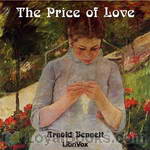 The Price of Love
The Price of Love
Rachel Louise Fleckring works for the elderly Mrs Maldon, and although with the woman for only a short time, she is taken into the heart of the family. She falls in love with one of Mrs Maldon’s descendents, but along the way, she has to come to terms with the fact that he isn’t, perhaps, the perfectly honest man she thought he was. | |
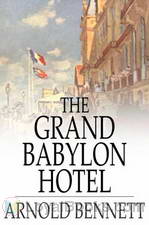 The Grand Babylon Hotel
The Grand Babylon Hotel
Theodore Racksole, a rich American multi-millionaire, buys the Grand Babylon Hotel, a luxurious hotel in London, as a whim – and then finds out there are strange things going on – a German prince is supposed to arrive but never turns up, someone is found murdered in the hotel, but then the body disappears. With the help of his independent daughter Nella and another German prince, Racksole sets out to solve the mystery.Bennett wrote this as a 15-part serial, for a lark, in 15 days, and sold it for 100 pounds. It first appeared in The Golden Penny in 1902, which described it as “the most original, amusing, and thrilling serial written in a decade”. | |
 The Old Wives' Tale
The Old Wives' Tale
The Old Wives’ Tale is a novel by Arnold Bennett, first published in 1908. It deals with the lives of two very different sisters, Constance and Sophia Baines, following their stories from their youth, working in their mother’s draper’s shop, into old age. It is generally regarded as one of Bennett’s finest works. It covers a period of about 70 years from roughly 1840 to 1905, and is set in Burslem and Paris. | |
 Literary Taste: How to Form It
Literary Taste: How to Form It
Arnold Bennett describes a method for enjoying literature, and suggests the contents of a comprehensive library. Chapters 1-10 and 14 describe his method for learning to enjoy literature. Chapters 11, 12, and 13 contain detailed lists of the 337 volumes required to complete a comprehensive library of English works. This reading is from the 1913 version at Project Gutenberg, and so does not contain the revisions made by Swinnerton for the 1939 edition, which included authors of the early Twentieth Century. Swinnerton’s revisions are available from Wikipedia. | |
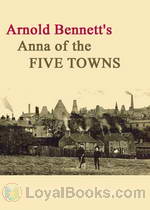 Anna of the Five Towns
Anna of the Five Towns
The plot centers on Anna Tellwright, daughter of a wealthy but miserly and dictatorial father, living in the Potteries area of Staffordshire, England. Her activities are strictly controlled by the Methodist church. Having escaped her father by marrying the respectable and attractive Henry, she attempts in vain to help Willy, son of a drunken and bankrupt business associate of her father's. | |
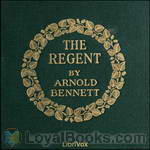 The Regent
The Regent
'The Regent' is, if not a sequel to 'The Card', then a 'Further Adventures of' the eponymous hero of that novel.Denry Machin is now forty-three and begins to feel that he is getting old, that making money and a happy home life are not enough and that he has lost his touch as the entrepreneur and entertainer of the 'Five Towns'.In fact, as he says to himself 'What I want is change - and a lot of it too!'. A chance meeting at the local theatre leads to his going to London and then... | |
 Clayhanger
Clayhanger
This first of a trilogy of novels is a coming-of-age story set in the Midlands of Victorian England, following Edwin Clayhanger as he leaves school, takes over the family business, and falls in love.The books are set in Bennett's usual setting of "the 5 Towns", a thinly-disguised version of the six towns of "the Potteries" which amalgamated (at the time of which Bennett was writing) into the borough (and later city) of Stoke-on-Trent.In one of the earlier chapters in the book, Bennett writes that... | |
 Ghost: A Modern Fantasy
Ghost: A Modern Fantasy
The novel opens with Carl Foster, a recently qualified doctor, coming to London to try and make his fortune. He meets a famous tenor, Signor Alresca, who suffers a dreadful injury backstage and Foster tends to him. He thus meets the lead soprano, Rosetta Rosa, and falls hopelessly in love with her.Alresca takes Foster under his wing and they travel to Alresca's home in Bruges. It is clear to Foster that Alresca has some strange obsession. Foster also notices a stranger who seems to be dogging his footsteps.Things take an even more sinister turn when Alresca inexplicably dies. . . | |
By: Arthur B. Reeve | |
|---|---|
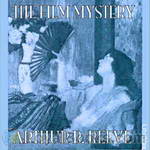 The Film Mystery
The Film Mystery
The Film Mystery is one of eighteen detective novels by Arthur B. Reeve starring his best known character Professor Craig Kennedy and his trusty sidekick Walter Jameson, a newspaper reporter. The pair bears an unmistakable resemblance to the more famous British master sleuth and his doctor friend. The setting of this mystery is the early days of movie making, and the murder victim is Stella Lamar, “the beautiful idol of the screen, beloved of millions”, who collapses and dies during the filming of a scene for her latest movie. | |
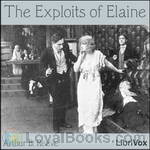 The Exploits Of Elaine
The Exploits Of Elaine
The Exploits of Elaine It tells the story of a young woman named Elaine who, with the help of a detective, tries to find the man, known only as “The Clutching Hand”, who murdered her father. (Wikipedia) | |
 The Silent Bullet
The Silent Bullet
The many adventures of Professor Craig Kennedy were chronicled by Arthur B. Reeve (October 15, 1880 - August 9, 1936). Reeve was an American mystery writer who created 82 Craig Kennedy mystery stories. The stories have a very Sherlock Holmes type feel, In fact Kennedy has been referred to as the "American Shelock Holmes". Along with his reporter friend, Walter Jameson, Kennedy solves many crimes and unveils mysteries using science. Each story features a facinating look at life in the early 20th century, and even includes some action along the way. | |
 Poisoned Pen
Poisoned Pen
The many adventures of Professor Craig Kennedy were chronicled by Arthur B. Reeve (October 15, 1880 - August 9, 1936). Reeve was an American mystery writer who created 82 Craig Kennedy mystery stories. The stories have a very Sherlock Holmes type feel, In fact Kennedy has been referred to as the "American Sherlock Holmes". Along with his reporter friend, Walter Jameson, Kennedy solves many crimes and unveils mysteries using science. This book contains twelve of Professor Kennedy's adventures. The interesting thing about these stories is Kennedy uses newly discovered science from his time period, which we take for granted today... | |
By: Arthur Griffiths (1838-1908) | |
|---|---|
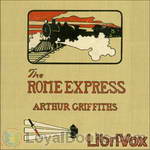 The Rome Express
The Rome Express
The passengers in the sleeping car of the Rome Express were just woken and informed that they will reach Paris soon, and a general bustle fills the train. Only one passenger cannot be awoken by the porter, no matter how loudly he knocks on the compartment door. At last, when the door is forced open, the occupant of the compartment is found dead - stabbed to the heart! The murderer must be found among the passengers... | |
 Passenger from Calais
Passenger from Calais
An army officer, and a mysterious lady with a maid and baby in tow, are the only passengers on the Engadine express from Calais. The lady is afraid that someone is following her. Who is she? And what is her strange package? One suspicious conversation and two private detectives later Colonel Basil Annesley is determined to find out! | |
By: Arthur J. Rees (1872-1942) | |
|---|---|
 The Shrieking Pit
The Shrieking Pit
The Shrieking Pit is one of Arthur Rees's earlier works, and is a good old fashioned murder mystery story. Grant Colwyn, a private detective, is holidaying in East Anglia when he notices a young man at a nearby table behaving peculiarly. The young man later leaves the hotel without paying his bill, and turns up in a nearby hamlet in the Norfolk marshes where he takes lodgings at the village inn. The next day, another guest at the inn is found dead, and the young man is missing. Can Colwyn sort out the mystery and prove the young man's innocence one way or the the other? | |
By: Arthur Machen (1863-1947) | |
|---|---|
 The Great God Pan
The Great God Pan
"The Great God Pan" is a novella written by Arthur Machen. A version of the story was published in the magazine Whirlwind in 1890, and Machen revised and extended it for its book publication (together with another story, "The Inmost Light") in 1894. On publication it was widely denounced by the press as degenerate and horrific because of its decadent style and sexual content, although it has since garnered a reputation as a classic of horror. Machen’s story was only one of many at the time to focus on Pan as a useful symbol for the power of nature and paganism... | |
 The Angels of Mons
The Angels of Mons
The Angels of Mons is a popular legend about a group of angels who supposedly protected members of the British army in the Battle of Mons at the outset of World War I. The story is fictitious, developed through a combination of a patriotic short story by Arthur Machen, rumours, mass hysteria and urban legend, claimed visions after the battle and also possibly deliberately seeded propaganda. | |
By: Asa Don Dickinson (1876-1960) | |
|---|---|
 The Children's Book of Christmas Stories
The Children's Book of Christmas Stories
Many librarians have felt the need and expressed the desire for a select collection of children's Christmas stories in one volume. This book claims to be just that and nothing more. Each of the stories has already won the approval of thousands of children, and each is fraught with the true Christmas spirit. It is hoped that the collection will prove equally acceptable to parents, teachers, and librarians. | |
By: August Strindberg (1849-1912) | |
|---|---|
 Countess Julie
Countess Julie
August Strindberg’s naturalistic one-act drama has only three characters: Julie, a passionate young noblewoman; Jean, her father’s ambitious valet; and Kristin, the cook, who is also Jean’s fiancee. The play is set on Midsummer Eve, when everyone is reveling, and Julie and Jean get a bit too intimate – with tragic results. | |
 Creditors
Creditors
Creditors is an 1889 tragicomedy by August Strindberg that plumbs the depths of the twisted triangular relationship between Tekla, her husband Adolph, and her ex-husband Gustav. | |
By: August von Kotzebue (1761-1819) | |
|---|---|
 Lover's Vows
Lover's Vows
Lovers' Vows (1798), a play by Elizabeth Inchbald arguably best known now for having been featured in Jane Austen's novel Mansfield Park (1814), is one of at least four adaptations of August von Kotzebue's Das Kind der Liebe (1780; literally "Child of Love," or "Natural Son," as it is often translated), all of which were published between 1798 and 1800. Inchbald's version is the only one to have been performed. Dealing as it does with sex outside marriage and illegitimate birth, Inchbald in the Preface to the published version declares herself to have been highly sensitive to the task of adapting the original German text for "an English audience... | |
By: Augusta Groner (1850-1929) | |
|---|---|
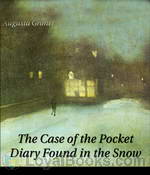 The Case of the Pocket Diary Found in the Snow
The Case of the Pocket Diary Found in the Snow
The account of some adventures in the professional experience of a member of the Imperial Austrian Police. (from the text) | |
 Case Of The Registered Letter
Case Of The Registered Letter
A man is found shot dead and the man to whom all evidence points insists he is innocent. | |
By: Ayn Rand (1905-1982) | |
|---|---|
 Anthem
Anthem
The title 'Anthem' is derived as an anthem to sense of self and self-governing thoughts. Anthem is a story of Equality 7-2521 who is a young man living in some unspecified future time and place. In this future era freedom and individual rights have been eradicated. The starring character of the novel is an inquisitive street cleaner. He lives in a society where people have lost their knowledge of individualism, to the extreme that people do not know words like 'I' or 'mine'. All the people live and work for their livelihood in collective groups, along with the people with power, namely the 'Councils'... | |
By: B. J. Farjeon (1838-1903) | |
|---|---|
 House of the White Shadows
House of the White Shadows
Is a defense attorney bound to defend his client, or with his conscience, when he knows that the man he is defending is guilty of the charges against him after the trial has already commenced? And if friends hold a belief that he may have been aware of it before the trial commenced, yet they are endeared to the man and his family as upstanding and of the highest grade? Might it not become cause for blackmail, and therefore potential retribution? "The House of White Shadows" brings these issues to the forefront, while the reader learns of the background of the advocate, his family history, and the house in question... | |
By: B. M. Bower (1871-1940) | |
|---|---|
 Lure of the Dim Trails
Lure of the Dim Trails
Phil Thurston was born on the range where the trails are dim and silent under the big sky. It was the place his father loved, the place he had to be. After the death of his father when he was five, his mother brought him back to the city, where he grew up and became a writer. To revive his stale writing, he returns to the West, and may just find what he is really missing. | |
By: Bankim Chandra Chatterjee (1838-1894) | |
|---|---|
 Kopal-Kundala
Kopal-Kundala
A story of love and innocence, by one of India's most loved novelist/ poets of the 20th century, the mentor of Rabindrath Tagore. | |
By: Baron Ludvig Holberg (1684-1754) | |
|---|---|
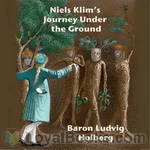 Niels Klim's Journey Under the Ground
Niels Klim's Journey Under the Ground
Niels Klim’s Underground Travels, originally published in Latin as “Nicolai Klimii Iter Subterraneum” (1741) is a satirical science-fiction/fantasy novel written by Ludvig Holberg, a Norwegian-Danish dramatist, historian, and essayist, born in Bergen, Norway. It was his first and only novel. It describes a utopian society from an outsider’s point of view, and often pokes fun at diverse cultural and social topics such as moral, science, sexual equality, religion, governments, and philosophy. | |
By: Baroness Emmuska Orczy (1865-1947) | |
|---|---|
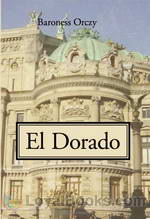 El Dorado
El Dorado
If you've read and loved the exciting classic The Scarlet Pimpernel then you'd probably be delighted to follow the further adventures of the dashing Sir Percy Blakeney. El Dorado by Baronness “Emmuska” Orczy depicts the intrepid swordsman and escape artist in the role of savior of the French royal family. Published in 1913, El Dorado was the fourth in the Pimpernel series of eleven books, numerous short stories and other related writings about her famous British adventurer. However, Orczy did not always follow a strict chronological sequence while publishing the novels and hence, there is plenty of overlap between the time frames of the stories... | |
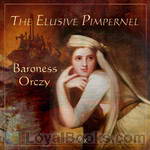 The Elusive Pimpernel
The Elusive Pimpernel
First Published in 1908, The Elusive Pimpernel by Baroness Orczy is the 4th book in the classic adventure series about the Scarlet Pimpernel. | |
By: Baroness Orczy (1865-1947) | |
|---|---|
 The Old Man in the Corner
The Old Man in the Corner
Created by Baroness Orczy, author of the famous Scarlet Pimpernel series, The Old Man in the Corner was one of the earliest armchair detectives, popping up with so many others in the wake of the huge popularity of the Sherlock Holmes stories. The Old Man relies mostly upon sensationalistic “penny dreadful” newspaper accounts, with the occasional courtroom visit for extra laughs. He narrates all this information (while tying complicated knots in a piece of string) to a Lady Journalist who frequents the same tea-shop. | |
 I Will Repay
I Will Repay
This is a sequel novel to the Scarlet Pimpernel. The second Pimpernel book written by Orczy, it comes (chronologically) third in the series and should be read after Sir Percy Leads the Band and before The Elusive Pimpernel. | |
By: Barry Pain (1864-1928) | |
|---|---|
 Eliza
Eliza
A gentle, yet deliciously humourous series of anecdotes following the life of the main character and his wife, Eliza. | |
 If Winter Don't
If Winter Don't
Barry Pain's parody takes a sharp knife to ASM Hutchinson's best selling novel 'If Winter Comes'.We follow the professional and marital decline of long suffering (and loving it), Luke Sharper, as his marriage to Mabel flounders while his love for Jona flourishes. It could only end in tears.....Or could it? ( | |
 Marge Askinforit
Marge Askinforit
A rollicking parody of the Margot Asquith memoirs, in which Pain’s character, Marge, beguiles us with the most personal details of her dysfunctional family, and delights in relating every cringing, if not wholly accurate, minutiae of her exciting private life. | |
By: Barton Wood Currie | |
|---|---|
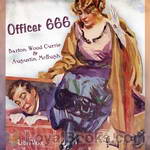 Officer 666
Officer 666
Bored with his life as a wealthy businessman's only son, Travers Gladwin learns of a plot by a renowned art burglar to rob his house, so rather than thwart the planned burglary, he borrows a police uniform from a friend and decides to confront the robber by posing as an officer. When the burglar arrives at the house, he tries to pass himself off as Travers Gladwin. From there, things only get more complicated, including the arrival of the burglar's girlfriend who believes that her beau is the wealthy man's son. Comical and timely, the book was made into a movie multiple times, each hugely successful. | |
By: Beatrix Potter (1866-1943) | |
|---|---|
 Great Big Treasury of Beatrix Potter
Great Big Treasury of Beatrix Potter
Whether you're a parent or a child, a young reader or an older one, the Great Big Treasury of Beatrix Potter is indeed just that – a treasure chest of delightful, charming little stories full of animals and people. Beatrix Potter today has spawned a whole industry of merchandise, games and theme parks, but the stories remain as fresh and sparkling as they were when they first came out in 1901. The Great Big Treasury contains three collections compiled into one enchanting volume - The Giant Treasury of Peter Rabbit, Further Tales of Peter Rabbit and The Giant Treasury of Beatrix Potter... | |
 Collection of Beatrix Potter Stories
Collection of Beatrix Potter Stories
What can we say about the delightful Beatrix Potter stories? Starting with the naughty Peter Rabbit and his mis-adventures, progressing through The Tale of Mrs. Tiggy-Winkle whose funny name is just the start of the interesting things about her, then expounding on the Tale of Jemima Puddle-Duck, and many many more, these stories are all gems of the art of story telling. This is your chance to enjoy reading them aloud and recording them for children to enjoy listening to in the years and decades to come. Aren't you curious to learn more about the Fierce Bad Rabbit? Or the Tale of the Two Bad Mice? This is your chance to read aloud. And remember to have fun !! | |
By: Ben Ames Williams | |
|---|---|
 All the Brothers Were Valiant
All the Brothers Were Valiant
Joel Shore, newly appointed captain of the whaling ship Nathan Ross following his brother’s apparent demise as captain of the same ship, elects to make his first cruise as captain to the very location where his brother had last been seen – the Gilbert Islands, in order to try to learn more about what happened to his brother. The focus of this tale is of that voyage halfway around the globe and the adventures which he and his crew encounter. | |
By: Ben Bova (1932-) | |
|---|---|
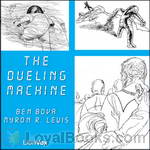 The Dueling Machine
The Dueling Machine
The Dueling Machine is the solution to settling disputes without injury. After you and your opponent select weapons and environments you are injected into an artificial reality where you fight to the virtual death… but no one actually gets hurt. That is, until a warrior from the Kerak Empire figures a way to execute real-world killings from within the machine. Now its inventor Dr. Leoh has to prevent his machine from becoming a tool of conquest. – The Dueling Machine, written with Myron R. Lewis, first appeared in the May, 1963 issue of Analog Science Fact & Fiction. | |
By: Ben Jonson (1572-1637) | |
|---|---|
 The Alchemist
The Alchemist
An outbreak of plague in London forces a gentleman, Lovewit, to flee temporarily to the country, leaving his house under the sole charge of his butler, Jeremy. Jeremy uses the opportunity given to him to use the house as the headquarters for fraudulent acts. He transforms himself into 'Captain Face', and enlists the aid of Subtle, a fellow conman and Dol Common, a prostitute. In The Alchemist, Jonson unashamedly satirizes the follies, vanities and vices of mankind, most notably greed-induced credulity... | |
 Volpone, or, The Fox
Volpone, or, The Fox
Volpone is a comedy by Ben Jonson first produced in 1606, drawing on elements of city comedy and beast fable. A merciless satire of greed and lust, it remains Jonson's most-performed play, and it is among the finest Jacobean Era comedies. Volpone is a Venetian gentleman who pretends to be on his deathbed, after a long illness, in order to dupe Voltore, Corbaccio, and Corvino, three men who aspire to inherit his fortune. In their turns, each man arrives to Volpone’s house bearing a luxurious gift, intent upon having his name inscribed to the will of Volpone, as his heir... | |
 Every Man In His Humour
Every Man In His Humour
Knowell, an old man - rumor says Shakespeare originally played this part - tries to spy upon the doings of his potentially wayward son. Meanwhile, Kitely, a merchant, worries so much about being cuckolded by his wife that perhaps it has to happen. All this while a swarm of other interesting characters surround them. - Summary by ToddHW Cast list: KNOWELL, an old Gentleman: ToddHW EDWARD KNOWELL, his Son: Rob Marland BRAINWORM, the Father's Man: Zames Curran GEORGE DOWNRIGHT, a plain Squire: Algy... | |
By: Benito Mussolini (1883-1945) | |
|---|---|
 Mussolini as Revealed in His Political Speeches (November 1914 - August 1923)
Mussolini as Revealed in His Political Speeches (November 1914 - August 1923)
Benito Mussolini was an Italian journalist and politician, the leader of the National Fascist Party. He grew up as a violent bully, and the characteristics developed in childhood aided his upward career and later rule in Italy. He was also an excellent orator, and this was one of the qualities that helped him rise to power.This project contains over 60 of his earlier speeches, covering the years 1914-1923: from soon after his expulsion from the Socialist Party for supporting WWI, to his becoming Prime Minister yet still submitting outwardly to democratic rule. - Summary by TriciaG | |
By: Benjamin B. Warfield (1851-1921) | |
|---|---|
 B. B. Warfield Collection, Volume 1
B. B. Warfield Collection, Volume 1
Many of B. B. Warfield's diverse and erudite theological writings were published as long articles in The Princeton Theological Review, sometimes spanning many issues of the periodical. The articles in this collection showcase the breadth of Warfield's scholarship and interest, his clarity of analysis of cultural trends and his deep Calvinistic piety. The B. B. Warfield Collection, Volume 2 The B. B. Warfield Collection, Volume 3 The B. B. Warfield Collection, Volume 4 | |
By: Benjamin Disraeli (1804-1881) | |
|---|---|
 Henrietta Temple
Henrietta Temple
The Armine family, in particular the young Ferdinand Armine, is in great financial difficulties. Ferdinand's grandfather has burdened the family estate with large debts, which his father did not manage to diminish. Ferdinand himself is not disposed to live with his small income alone, and during his time in Malta with his regiment, he incurs debts of his own. The only thing that can easily pay for his debts and restore the house of Armine now is for Ferdinand to marry well, and the chosen wife for him is his cousin Katherine, the heiress to their grandfather's wealth... | |
By: Bertrand Sinclair (1881-1972) | |
|---|---|
 The Hidden Places
The Hidden Places
Hollister, returning home from the war physically scarred but otherwise healthy and intact, finds life difficult among society, and so chooses to roam about a bit seeking a future for himself. He eventually leads himself to a remote area in British Columbia, which begins the tale of the next phase of his life; a life which becomes far richer in totality than he would have imagined in his old unwelcoming haunts. A life among the hidden places. | |
By: Bjørnstjerne Bjørnson (1832-1910) | |
|---|---|
 Happy Boy
Happy Boy
"A Happy Boy" was written in 1859 and 1860. It is, in my estimation, Bjørnson's best story of peasant life. In it the author has succeeded in drawing the characters with remarkable distinctness, while his profound psychological insight, his perfectly artless simplicity of style, and his thorough sympathy with the hero and his surroundings are nowhere more apparent. This view is sustained by the great popularity of "A Happy Boy" throughout Scandinavia. (From the Preface) Bjørnstjerne Bjørnson received the Nobel Prize in Literature in 1903. | |
By: Bliss Carman | |
|---|---|
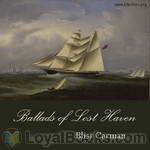 Ballads of Lost Haven: A Book of the Sea
Ballads of Lost Haven: A Book of the Sea
This collection of lyric poems evokes the sea in every line, from birth (A Son of the Sea) to death (Outbound). The smells, sights and sounds of the Canada's East Coast feature prominently. | |
By: Bliss Perry (1860-1954) | |
|---|---|
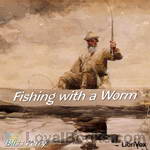 Fishing with a Worm
Fishing with a Worm
Fishing with a Worm by Bliss Perry includes the poignant and philisophical observations of a fly fisherman lured by the worm. Bliss Perry was a professor of literature at Princeton and Harvard Universities and spent time in Vermont writing and fly fishing. | |
By: Booth Tarkington | |
|---|---|
 Alice Adams
Alice Adams
A Pulitzer Prize-winning novel, Alice Adams chronicles the attempts of a lower middle class American midwestern family at the turn of the 20th century to climb the social ladder. The eponymous heroine is at the heart of the story, a young woman who wants a better place in society and a better life. As Gerard Previn Meyer has stated, “Apart from being the contribution to social history its author conceived it to be, [Alice Adams] is something more, that something being what has attracted to it so large a public: its portrait of a (despite her faults) ‘lovable girl’.” | |
 Seventeen
Seventeen
A Tale of Youth and Summer Time and the Baxter Family Especially William | |
 Gentle Julia
Gentle Julia
Penrod for girls in the form of Florence, the bratty younger cousin of luminous Julia Atwater, enlivens this romantic comedy set in Tarkington's Indiana of the early 20th Century. | |
 Penrod
Penrod
Join Penrod Schofield and his wistful dog Duke, in a hilarious romp through turn of the century Indianapolis, chronicling his life, loves, and mostly the trouble he gets into. | |
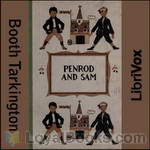 Penrod and Sam
Penrod and Sam
Follow more of the hilarious life of the boy Penrod Schofield, his friends Sam Williams, Herman, Verman, Georgie, Maurice, and the love of his life, Marjorie Jones. | |
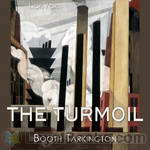 The Turmoil
The Turmoil
The Turmoil is the first novel in the ‘Growth’ trilogy, which also includes The Magnificent Ambersons (1918) and The Midlander (1923, retitled National Avenue in 1927). In 1942 Orson Welles directed a film version based on volume 2, also titled “The Magnificent Ambersons.” The trilogy traces the growth of the United States through the declining fortunes of three generations of the aristocratic Amberson family in a fictional Mid-Western town, between the end of the Civil War and the early part of the 20th century, a period of rapid industrialization and socio-economic change in America... | |
 Monsieur Beaucaire
Monsieur Beaucaire
A madcap Frenchman posing as an ambassador's barber blackmails a dishonest duke to introduce him as a nobleman to a wealthy belle of Bath. Since the duke himself hopes to mend his fortunes by wedding this very woman, he attempts to murder Beaucaire, and failing that to discredit him. To test the lady's mettle, Beaucaire allows his deception to be exposed--up to a point--and there we must draw the curtain to preserve the surprise ending. ( | |
By: Bram Stoker | |
|---|---|
 The Jewel of Seven Stars
The Jewel of Seven Stars
The Jewel of Seven Stars (also published under the name: The Jewel of the Seven Stars) is a horror novel by Bram Stoker first published in 1903. The story is about an archaeologist’s plot to revive Queen Tera, an ancient Egyptian mummy. | |
 Dracula's Guest and other Weird Tales
Dracula's Guest and other Weird Tales
Nine Gothic Horror Tales by the author of Dracula. Note : These tales are not for the squeamish!!! 0r a dark windy night. | |
By: Bret Harte (1837-1902) | |
|---|---|
 Selected Stories
Selected Stories
Bret Harte (1837–1902) was an American author and poet, best remembered for his accounts of pioneering life in California. | |
 Mrs. Skagg's Husbands and Other Stories
Mrs. Skagg's Husbands and Other Stories
A collection of short stories set in the American West at the end of the 19th century. | |
 What the Wolf Really Said to Little Red Riding Hood
What the Wolf Really Said to Little Red Riding Hood
Francis Bret Harte was an American author and poet, best remembered for his short fiction featuring miners, gamblers, and other romantic figures of the California Gold Rush. In a career spanning more than four decades, he wrote poetry, fiction, plays, lectures, book reviews, editorials, and magazine sketches in addition to fiction. As he moved from California to the eastern U.S. to Europe, he incorporated new subjects and characters into his stories, but his Gold Rush tales have been most often reprinted, adapted, and admired. | |
By: Brontë sisters | |
|---|---|
 Selected Poems by Currer, Ellis and Acton Bell
Selected Poems by Currer, Ellis and Acton Bell
Poems by Currer, Ellis and Acton Bell was a volume of poetry published jointly by the three Bronte sisters, Charlotte, Emily and Anne in 1846, and their first work to ever go in print. To evade contemporary prejudice against female writers, the Bronte sisters adopted androgynous first names. Marked by profound sentiments, gravity and melodious harmony, the poems are strewn on the fields of soulful love, rueful reminiscence and the immortal yearnings of a Christian soul, and represent a fragrant assemblage of noetic flowers from the glebes of olden England... | |
By: BS Murthy | |
|---|---|
 Bhagvad-Gita: Treatise of Self-help
Bhagvad-Gita: Treatise of Self-help
The spiritual ethos and the philosophical outlook that the Bhagvad - Gita postulates paves the way for the liberation of man, who, as Rousseau said, ‘being born free, is everywhere in chains’. But equally it is a mirror of human psychology, which enables man to discern his debilities for appropriate redressal. All the same, the boon of an oral tradition that kept it alive for over two millennia became its bane with the proliferation of interpolations therein. Besides muddying its pristine philosophy, these insertions affect the sequential conformity and structural economy of the grand discourse... | |
By: Burton E. Stevenson (1872-1962) | |
|---|---|
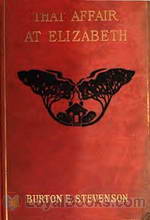 That Affair at Elizabeth
That Affair at Elizabeth
A detective novel set in turn-of-the-century New York City, in which a young lawyer plays the sleuth. Packed with plot twists (and the ubiquitous romantic complication, of course). ( | |
By: Burton Egbert Stevenson (1872-1962) | |
|---|---|
 Gloved Hand
Gloved Hand
Mr. Lester, a private investigator, and his friend Godfrey are caught up in a strange case that takes them to a large estate in the country where at midnight they witness a mysterious "falling star" that appears to burst into a shower of sparks over two white robed figures standing in the air. There is a young lady in a flowing white dress and many more twists and complications before the mystery is solved. | |
 Holladay Case
Holladay Case
Stevenson's introduction of the protagonist Lester (law clerk with New York firm Graham & Royce) finds him occupying a front row seat in the murder trial of Wall Street multi-millionaire Hiram Holladay. Scandalously, suspicion points very solidly on the banker's loving daughter, Frances. Lester proves himself a useful aide to the firm's senior partner, Mr. Royce, in his attempt to prove the lovely Frances innocent. | |
 Mystery of the Boule Cabinet
Mystery of the Boule Cabinet
Three men are dead. Killed by a very powerful poison. Their deaths seem to be connected to a very old cabinet purchased in France and a notorious French criminal. What is the link? It is up to the lawyer Lester and the newspaperman Godfrey to pool their talents and solve the mystery. | |
By: C. F. Tucker Brooke (1883-1946) | |
|---|---|
 Introduction to Shakespeare Apocrypha
Introduction to Shakespeare Apocrypha
"The ambition of the editor has been to provide an accurate and complete text, with adequate critical and supplementary matter, of all those plays which can, without entire absurdity, be included in the 'doubtfully Shakespearian' class." This project provides the Preface and Introduction of this book, wherein some 42 candidate Shakespeares are whittled down to some 14 plays "which alone appear entitled, on grounds either of reason or of custom, to a place among the Shakespeare Apocrypha." The book then presents the text of the 14 plays; performances of these play texts will be presented separately in our catalog... | |
By: C. J. Dennis (1876-1938) | |
|---|---|
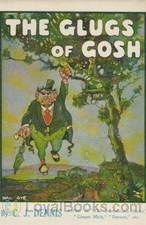 The Glugs of Gosh
The Glugs of Gosh
First published in 1917, The Glugs of Gosh satirizes Australian life at the start of the twentieth century – but the absurdities it catalogs seem just as prevalent at the start of the twenty-first. The foolishness of kings, the arrogance of the elite, the gullibility of crowds, the pride of the self-righteous, the unthinking following of tradition – all find themselves the targets of C. J. Dennis’ biting wit. | |
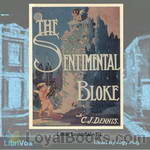 The Songs of a Sentimental Bloke
The Songs of a Sentimental Bloke
The Songs of a Sentimental Bloke is a verse novel by Australian novelist and poet C. J. Dennis. The book sold over 60,000 copies in nine editions within the first year, and is probably one of the highest selling verse novels ever published in Australia.The novel tells the story of Bill, a larrikin of the Little Lonsdale Street Push, who is introduced to a young woman by the name of Doreen. The book chronicles their courtship and marriage, detailing Bill’s transformation from a violence-prone gang member to a contented husband and father. C.J. Dennis went on to publish three sequels to this novel: The Moods of Ginger Mick (1916), Doreen (1917) and Rose of Spadgers (1924) | |
 Digger Smith
Digger Smith
“Digger Smith” is a series of narrative poems about an Australian soldier coming home in the closing months of the Great War minus a leg and with “ANZAC eyes” ... what a later war would call “The Thousand Yard Stare”. Despite his post-traumatic stress disorder, Digger Smith sets about ministering to everybody’s troubles but his own ... his internal conviction that his amputee status will make him seem “half a man” in the eyes of the lady love he left behind when he went off to the War. Oh Digger Smith, how little faith you have in woman... - Summary by Son of the Exiles | |
By: C. S. Lewis (1898-1963) | |
|---|---|
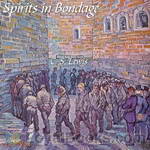 Spirits in Bondage: a cycle of lyrics
Spirits in Bondage: a cycle of lyrics
First published in 1919 under his pseudonym Clive Hamilton, Spirits in Bondage, is also the first published book by the notorious novelist C.S. Lewis. This early piece of work represents Lewis’ youth, as it was written at a time when the author had just returned from his military service in the First World War. In addition it differentiates itself from his other works, not just in terms of style, but also in themes due to his agnostic stand at the time. Written in the form of poetry, the piece is divided into three sections of poetry, each intended to be read in chronological order to gain complete access to its themes and ideas... | |
By: Cal Stewart (1856-1919) | |
|---|---|
 Uncle Josh's Punkin Centre Stories
Uncle Josh's Punkin Centre Stories
A collection of comedic short stories from the perspective of an old country man. | |
By: Captain S. P. Meek (1894-1972) | |
|---|---|
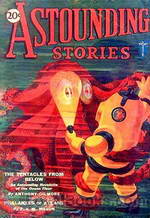 Astounding Stories 14, February 1931
Astounding Stories 14, February 1931
This issue includes "Werewolves of War" by D. W. Hall, "The Tentacles from Below" by Anthony Gilmore, "The Black Lamp" by Captain S. P. Meek, "Phalanxes of Atlans" by F. V. W. Mason, and contues with "The Pirate Planet" by Charles W. Diffin, | |
By: Carl Sandburg (1878-1967) | |
|---|---|
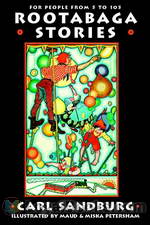 Rootabaga Stories
Rootabaga Stories
Carl Sandburg is beloved by generations of children for his Rootabaga Stories and Rootabaga Pigeons (which is not in the public domain), a series of whimsical, sometimes melancholy stories he originally created for his own daughters. The Rootabaga Stories were born of Sandburg’s desire for “American fairy tales” to match American childhood. He felt that the European stories involving royalty and knights were inappropriate, and so populated his stories with animals, skyscrapers, trains, corn fairies, and other colorful characters. | |
By: Carlo Collodi (1826-1890) | |
|---|---|
 Pinocchio
Pinocchio
This is the wonderful story of Pinocchio, the puppet who must learn many lessons before he can become a real boy. Carved by a woodcarver named Geppetto in a small Italian village, he dreamed of becoming a real boy but strays from the path of goodness many times and is very willing to listen to temptation. He has also been used as a character who is prone to telling lies and fabricating stories for various reasons. The story has appeared in many adaptations in other mediums. Pinocchio has been called an icon of modern culture, and one of most reimagined characters in the pantheon of children's literature... | |
By: Caroline Atwater Mason (1853-1939) | |
|---|---|
 Woman Of Yesterday
Woman Of Yesterday
Anna is the daughter of a clergyman in a small town in Vermont. She is very happy with her lot. But when she goes to nurse a woman in the big city, she starts to discover the world. She sees new places, meets new people, and falls in love. This will test all the resolutions she once held dear. - Summary by Stav Nisser. | |
By: Caroline Lockhart (1871-1962) | |
|---|---|
 The Fighting Shepherdess
The Fighting Shepherdess
A classic style western written by one of the first female western writers. Caroline Lockhart was a rancher, writer and possibly the first woman to go over Glacier National Parks Swiftcurrent Pass. | |
 Dude Wrangler
Dude Wrangler
Spoiled, handsome, 24 year old Easterner meets pretty, no-nonsense gal from Wyoming, is instantly smitten and does a sea-change to try and impress her in this genial romantic comedy. | |
By: Carolyn Wells (1862-1942) | |
|---|---|
 Gold Bag
Gold Bag
The case involves a millionaire murdered in his study, suspicious servants, a beautiful niece, a private secretary and a will. enamored. A Holmes like detective is brought in to solve the mystery. | |
By: Catherine Grace Frances Gore (1798-1861) | |
|---|---|
 Mrs. Armytage, or Female Domination
Mrs. Armytage, or Female Domination
Mrs Armytage is a widowed landowner, spirited, independent and very much used to having her own way and exercising total dominance over her family. She is acutely aware of social distinctions, proud of her power and prestige, and stands on her dignity to the point of becoming cold, judgemental and aloof. Her character flaws bring her into conflict with her children when her son Arthur announces his choice of a wife who is very much below their rank, and much will happen before Mrs Armytage learns to repent her behaviour... | |
By: Catherine Helen Spence (1825-1910) | |
|---|---|
 Mr. Hogarth's Will
Mr. Hogarth's Will
Jane and Elsie Melville were raised by their kindly but eccentric uncle, Mr Hogarth who believed that women were just as good as men, and thus gave his nieces a boy’s education. Upon his death, they find that he has left his entire fortune to his heretofore unknown son and left them only a small allowance, expecting them to make their own way in the world using the education he furnished them. Will the girls survive in a world that expects them, at the most, to become governesses? | |